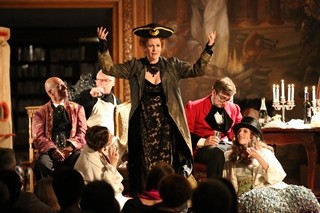|
Back
Variations on a Theme by Hugo von Hofmannsthal München
Schloss Neubeuern, Germany
10/11/2014 - & October 12*, 2014
John Deathridge: Das kleine Welttheater (adapted from Hugo von Hofmannsthal)
Richard Leitner (Der Dichter), Lisa-Marie Schett (Die Fremde), Johanna Metzger (Betreuerin der Wahnsinnigen), Laura Fernanda Pressler (Das Mädchen), Victoria Real (Die schöne Stimme), Hermann Hiemer (Der Gärtner), Lukas Wiemers (Der junge Herr), Josef Mager (Der Arzt), Enoch zu Guttenberg (Der Diener), Georg Hiemer (Der Wahnsinnige), Reinhard Käsinger (Der Maler), Laurenz Wagner (Livrierter 1), Tom Kramer (Livrierter 2), Jörg Müller (Der Hausherr)
John Deathridge (piano, musical supervision)
Annegret Ritzel (direction)

(© Neubeurer Woche)
One of the pillars of the rich cultural life in Germany is its small, locally managed festivals. In times of general financial distress these laudable local culture initiatives have a particularly difficult stand and therefore deserve special attention and support.
Neubeuern, a small town in Bavaria, near the Austrian border, has a surprisingly rich cultural life. The Neubeuern Choir calls this picturesque village at the feet of the Alps its home and has gained world fame under the charismatic conductor Enoch zu Guttenberg.
The Neubeuern castle, now home to a top international boarding school, looks back at a colorful history. At the beginning of the last century it served as a meeting point for artists and intellectuals. Hugo von Hofmannsthal and his friends met regularly at the castle to exchange ideas or to simply have a good time. With reference to this tradition, the local cultural association organizes an annual weekend of concerts, readings, exhibitions and theater dedicated to Hugo von Hofmannsthal and his circles.
This year's festival highlight was the performance of Hugo von Hofmannsthal's Das kleine Welttheater ("The Small World Theatre") in an adaptation by Annegret Ritzel, with original music written and performed by John Deathridge.
Das kleine Welttheater originally consists of eight monologues. Written by Hofmannsthal at age 23, it displays the highest level of literary artistry, so lofty that even Hofmannsthal himself didn't consider his work suitable for the stage. In fact, it was performed only once in its original version - at Hofmannsthal’s memorial service 1929 in Munich.
Ritzel had crafted a frame story around these monologues: a group of eccentric, highbrow intellectuals gather for New Year's dinner 1914. Spontaneously they decide to read for Hugo von Hofmannsthal his "Small World Theatre". Sadly, most of the monologues were omitted or cut down to a minimum, and in the end there was hardly any original Hofmannsthal text left. Instead, Ritzel completely lost herself portraying an overexcited, nervous group of intellectuals and artists, torn between fears and hopes in politically unsettling times.
Ritzel’s concept didn’t pay off, mainly due to the fact that she had a mixed group of semi-professional and amateur actors at her disposition. The subtleties of the intended psychogram of a generation of artists would have required the highest art of acting – something one simply cannot expect from amateur actors. However, the cast showed infectious enthusiasm. Conductor Enoch zu Guttenberg lent his voice and presence to Henry van de Velde alias “the servant”. Outstanding the performance of Lisa-Marie Schett as Hofmannsthal’s wife, or “Die Fremde”, refreshing Lukas Wiemer’s light-hearted portrait of “Der junge Herr”. Victoria Real, with her beautiful dark timbre soprano, mastered the difficult task to sing an almost thoroughly unaccompanied song staying almost in tune.
John Deathridge, composer, musicologist, pianist, organist and professor at London's King's College performed his original music on the piano. Deathridge is considered one of the world's foremost experts on Richard Wagner - and this was only too obvious in his compositions. He had borrowed many themes from Richard Strauss, for obvious reasons, but there was also some Wesendonck-Songs or a Tristan Overture, some Meistersinger and a whole lot more of Wagnerian quotes, whose meanings were not apparent in this context. Mozart’s Don Giovanni as well as Johann Strauss’ Annenpolka were quoted or paragraphed. The most original aspect in Deathridge’s composition was that he had dedicated each of the characters a theme composed from the letters of their names.
The fact that Ritzel and Deahtridge made the group gathered around Hofmannsthal sing Auld Lang Syne at the stroke of midnight, was symptomatic for how little both had understood about the German/Austrian culture and traditions of the fin de siècle.
The spectacular location, the enthusiastic, dedicated cast, beautiful costumes, and – yes, good food, even for the audience - made up for the Hofmannsthal texts we didn’t get to hear.
Neubeurer Festival
Wiebke Kuester
|